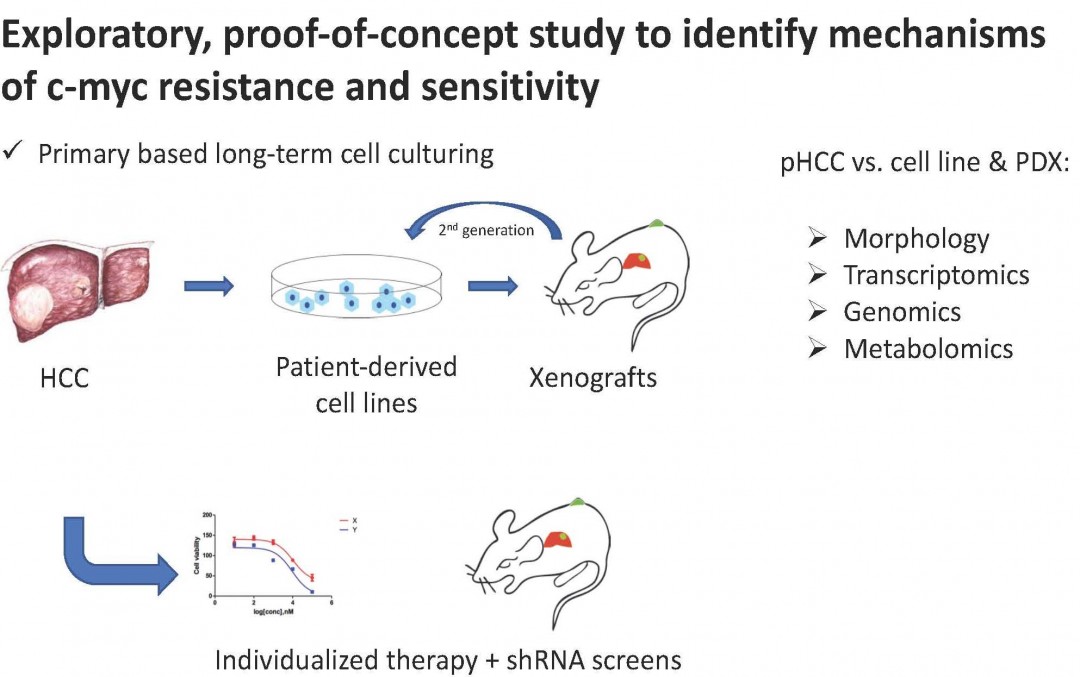Publications
a) Peer-reviewed articles and books
• Kendre G, Marhenke S, Lorz G, Kühnel F, Woller N, Reineke-Plaaß T, Poth T, Becker D, Marquardt JU, Wirtz RM, Bonin M, Saborowski M, Vogel A*, Saborowski A* (2021). The co-mutational spectrum determines the therapeutic response in murine FGFR2 fusion - driven cholangiocarcinoma. Hepatology. doi: 10.1002/hep.31799. *equal contribution.
• Buitrago-Molina LE, Marhenke S, Becker D, Geffers R, Itzel T, Teufel A, Jaeschke H, Lechel A, Unger K, Markovic J, Sharma AD, Marquardt JU, Saborowski M, Saborowski A*, Vogel A* (2021). p53-independent induction of p21 fails to control regeneration and hepatocarcinogenesis in a murine liver injury model. Cell Mol Gastroenterol Hepatol 11:1387-1404. *equal contribution.
• Owusu Sekyere S, Schlevogt B, Mettke F, Kabbani M, Deterding K, Wirth TC, Vogel A, Manns MP, Falk CS, Cornberg M, Wedemeyer H (2019) HCC immune surveillance and antiviral therapy of hepatitis C virus infection. Liver Cancer 8:41-65.
• Erlangga Z, Wolff K, Poth T, Peltzer A, Nahnsen S, Spielberg S, Timrott K, Woller N, Kühnel F, Manns MP, Saborowski A, Vogel A*, Saborowski M* (2019) Potent antitumor activity of liposomal irinotecan in an organoid- and CRISPR-Cas9-based murine model of gallbladder cancer. Cancers 11:1904. *contributed equally
• Saborowski A, Wolff K, Spielberg S, Beer B, Hartleben B, Erlangga Z, Becker D, Dow LE, Marhenke S, Woller N, Unger K, Schirmacher P, Manns MP, Marquardt JU, Vogel A, Saborowski M (2019) Murine liver organoids as a genetically flexible system to study liver cancer in vivo and in vitro. Hepatol Commun 3:423-436.
• Zhu AX, Finn RS, Edeline J, Cattan S, Ogasawara S, Palmer D, Verslype D, Zagonel V, Fartoux L, Vogel A, Sarker D, Verset G, Chan SL, Knox J, Daniele B, Webber AL, Ebbinghaus SW, Ma J, Siegel AB, Cheng AL, Kudo M (2018) Pembrolizumab in patients with advanced hepatocellular carcinoma previously treated with sorafenib (KEYNOTE-224): a non-randomised, open-label phase 2 trial. Lancet Oncol 7:940-952.
• Mettke F, Schlevogt B, Deterding K, Wranke A, Smith A, Port K, Manns MP, Vogel A, Cornberg M, Wedemeyer H (2018) Interferon-free therapy of chronic hepatitis C with direct-acting antivirals does not change the short-term risk for de novo hepatocellular carcinoma in patients with liver cirrhosis. Aliment Pharmacol Ther 47:516-525
• Endig J, Buitrago-Molina LE, Marhenke S, Reisinger F, Saborowski A, Schütt J, Limbourg F, Könecke C, Schreder A, Michael A, Misslitz AC, Healy ME, Geffers R, Clavel T, Unger K, Finegold M, Weber A, Manns MP, Longerich T, Heikenwälder M, Vogel A (2016) Dual role of the adaptive immune system in liv-er injury and hepatocellular carcinoma development. Cancer Cell 30:308-23.
b) Other publications, both peer-reviewed and non-peer-reviewed
• Abou-Alfa GK, Sahai V, Hollebecque A, Vaccaro G, Melisi D, Al-Rajabi R, Paulson AS, Borad MJ, Gal-linson D, Murphy AG, Oh DY, Dotan E, Catenacci DV, Van Cutsem E, Ji T, Lihou CF, Zhen H, Féliz L, Vogel A (2020) Pemigatinib for previously treated, locally advanced or metastatic cholangiocarcinoma: a multicentre, open-label, phase 2 study. Lancet Oncol 5:671-684.
• Saborowski A, Vogel A (2020) FGFR inhibitors in cholangiocarcinoma: what’s now and what’s next? Ther Adv Med Oncol 12:1758835920953293.
• Vogel A, Cervantes A, Chau I, Daniele B, Llovet JM, Meyer T, Nault JC, Neumann U, Ricke J, Sangro B, Schirmacher P, Verslype C, Zech CJ, Arnold D, Martinelli E (2018) Hepatocellular carcinoma: ESMO clin-ical practice guidelines for diagnosis, treatment and follow-up. Ann Oncol 29: iv238-iv255.
• Vogel A, Kasper S, Bitzer M, Block A, Sinn M, Schulze-Bergkamen H, Moehler M, Pfarr N, Endris V, Goeppert B, Merx K, Schnoy E, Siveke JT, Michl P, Waldschmidt D, Kuhlmann J, Geissler M, Kahl C, Evenkamp R, Schmidt T, Kuhlmann A, Weichert W, Kubicka S (2018) PiCCA Study - Panitumumab in combination with cisplatin/gemcitabine chemotherapy in KRAS wild-type patients with biliary cancer - a randomized biomarker-driven clinical phase II AIO study. Eur J Cancer 92:11-19.
